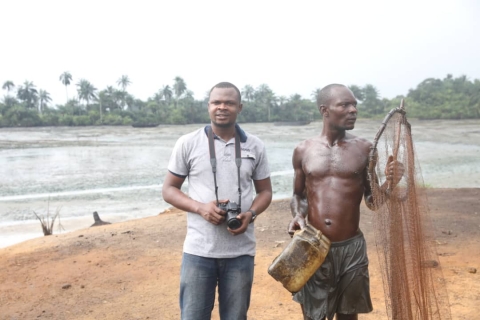Ruth Olurounbi and Kelechukwu Iruoma were among the first recipients of the inaugural ICFJ Alumni Reporting Grants. Learn about other grantees Verah Okeyo, Josh Landis and Phil Cunningham.

From the late 1950s, when oil exploration and production began in the Niger Delta, until it was suspended in the early 1990s, millions of barrels of oil were spilled, contaminating the land and water in a region of Nigeria known as Ogoniland, inhabited by the Ogoni people. They are among the oldest settlers in the area, which today is home to 850,000 people, many of whom rely on farming and fishing to make a living.
It is there that journalists Ruth Olurounbi and Kelechukwu Iruoma, chosen by Microsoft News and the International Center for Journalists for an ICFJ Alumni Reporting Grant, focused their work, emphasizing immersive storytelling. The duo is investigating how the contamination has affected the health of those who live in Ogoniland. Previous studies have linked oil spills to cancer, childhood malnutrition and low fertility, among other health problems.
“It’s one thing to lose your livelihood. If you do not lose your health, I believe that you can always, always get your livelihood back,” says Olurounbi. “But the moment you lose your health, you have lost everything.”
Olurounbi, who lives in Abuja, Nigeria, is business editor for Per Second News, a U.S.-based media organization. Iruoma, who lives in Lagos, Nigeria, is a freelance journalist and photographer whose works have been published by NPR, Al Jazeera, Thomson Reuters Foundation and TRT World, among other publications. The two know each other from a previous fellowship program.
They teamed up for the grant project, sharing a determination borne from frustration over what they say are years of government slowness to pay for the cleanup work, something the United Nations called for in 2011. A UN Environment Programme (UNEP) report presented to the Nigerian government that same year concluded the Ogoni community was being exposed to high levels of chemicals from the oil spills through the air and drinking water. They were also being exposed through their skin from contaminated soil, sediments and surface water. “Environmental restoration” was “possible,” but could take up to 30 years, the report said.
In 2017, the government announced it would clean up the contaminated environment, six years after the UNEP presented its findings.
“The government hired contractors to do the work, but there’s no seriousness in the effort, says Iruoma. “We have to let them know they have to take the cleanup very seriously.”
As part of the grant, Microsoft and ICFJ provided training to Olurounbi and Iruoma on how to use drones to capture still and video photography of the contaminated areas.
“We have pictures and videos that show the contaminated soil and rivers, rivers where people fish or where they go to take water, even now,” Iruoma says. “We used the drone photos and video to show clearly how the oil spill affected the livelihood of the people.”
Iruoma, previously among the winners of an ICFJ story contest on migration and climate, is passionate about improving the quality of life for Nigerians who live in rural areas, which is half of the country’s total population of 200 million. Olurounbi has focused on health, development, agricultural and human rights issues in much of her work.
On one of her reporting trips to Ogoniland, Olurounbi met a woman who was trying to grow cassava and corn on the land left to her by her late husband but is contaminated from the oil spill. Despite her comparatively brief exposure, the odor made Olurounbi dizzy.
For the widow, moving elsewhere is not an option.
“In our culture, land is very important to us, and if you are left a piece of land by a husband, you are left something very dear; you are left a legacy. And you don’t move away from that,” Olurounbi says.
But every year, the woman is harvesting “less and less, because the land will not produce,” Olurounbi says.
Both Olurounbi and Iruoma grew up with a love of reading and a desire to make their country a better place to live. Olurounbi’s parents were both veterinarians and missionaries. When she told her mother that she was thinking of becoming a journalist, her mother encouraged her to do it.
“‘This is something that is very powerful, because you get to hold the government accountable,’” my mother told me. “At the time I grew up, the government was this very powerful thing that you feared; you could get jailed for anything. Holding such a big government accountable sounded very interesting to me.”
Working as a journalist in Nigeria was, and continues to be, a risky occupation. The Committee to Protect Journalists has placed the country on its Impunity Index, which ranks countries with the worst records of unsolved murders of journalists.
“It is very challenging to be a journalist in Nigeria,” says Iruoma. “But if we do not make the government accountable, who will hold them accountable? I know it’s difficult for the government to take action in this country, but we will keep pushing. We will keep doing our stories to ensure that the government will take the cleanup seriously.”
This article first appeared on Microsoft Stories here. Suzanne Choney is a writer with Microsoft Stories.